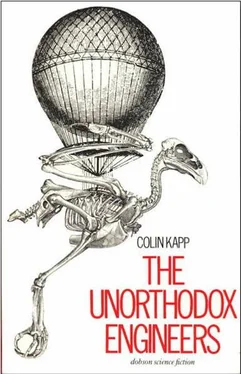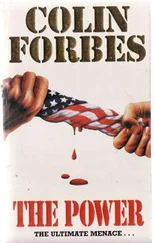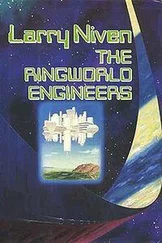‘Look to the end there,’ said Van Noon. ‘Where the mountain reaches down to the steppe there’s a silvery outcropping containing a series of thrust faults. That’s a typical formation distributed widely over the surface of Getawehi. Like the burning mountain, the lamellar layers show marked transistor action. The outcrop is predominantly laminated silicon semiconductor layers. Subjected to the terrain currents, almost every similar outcrop is a radio transmitter at some state of the current flow.’
Nash stopped and wiped his brow. ‘I won’t buy that one, Fritz. I grant you that you have the current and you appear to have the semiconductor material. But even I know that you don’t get a radio transmitter by throwing random transistors into a box.’
‘No,’ said Fritz, ‘but there is a logical explanation. In these fractured semiconductor masses you have potentially every aspect of transmitter function: capacitance, resistance, inductance, switching, amplification, and even piezo-electric oscillation. And you have time.’
‘I don’t see what time has to do with it?’
’Evolution takes time, Colonel. Pass too much current through a transistor junction and you destroy it. Start with an infinity of potential transistor circuit paths and destroy and modify them slowly, and one day you’ll strike a circuit which will function—it will dissipate current rather than be destroyed by it. Continue the process for long enough and the only circuits which survive will be those capable of dissipating energy. Thus active circuits will become the rule rather than the exception—by a process analogous to natural selection on a biological level. The burning mountain survives by dissipating the electrical energy in the form of light. The small outcrops predominantly dissipate in the radio frequencies.’
‘I still find it hard to believe,’ said Nash.
‘When you consider the capabilities of natural selection processes, a radio transmitter is a far less unlikely product than is a human being,’ said Fritz quietly.
Nash looked at his hands reflectively, then nodded. ‘And you used one of these outcrops as a transmitter to contact the Tycho Brahe?’
‘We had to—er—modify it to suit our needs. But yes—that’s basically what we did do.’
‘I see,’ said Nash. ‘Your ingenuity does you credit, Fritz… but then I suppose that’s what we employ unorthodox engineers for.’
‘In this case,’ said Fritz, ‘I can’t help feeling that Jacko surpassed himself. He can claim to be the first man—and I suspect also the last—ever to add an audio modulator to a solid state transmitter… with a pickaxe!’
‘The basic philosophy behind the Unorthodox Engineers is simple,’ said Fritz Van Noon. ‘As our penetration of deep space continues, so communications and supply lines grow longer, finally impossibly long.
And the transport costs of even simple items become disproportionately high.
‘For instance, the price-penalties of space-freight are such that a simple spanner required on Aldebaran-seven costs sixteen times its weight of platinum on Terra. Assuming you can afford it, delivery time by hyper-ship can be anything up to three years.’
He waited until the buzz of conversation in the audience had died again. Then he continued. At his side, he was aware of Colonel Belling’s dark scowl of disapproval, but decided to ignore it.
‘If we’re to take advantage of the new space-territories the hyper-ships are opening up to us, if we’re to build out on the Rim something men can use as the foundations of a colony, we need engineering—and we need plenty of it.
‘So who should we send? Mechanics who can’t obtain any steel? Engineers whose nearest machine shop is fifty light years away? Or should we send the men who can make a plough out of a stick, a stone, and a length of creeper? The answer’s obvious. You can send a few tools, but the thing that counts most at the edge of the galaxy is man’s own unparalleled ingenuity—the ability to use anything available to your own peculiar advantage.
‘And that, Gentlemen, is the function of unorthodox engineering. It’s the habit of breaking with the traditional disciplines and learning how to construct the nucleus of a functional civilization out of bits of string and matchsticks, if necessary. To hell with what it says in the book. It may not even look like engineering—but if it works, it’s justified.’
Shortly the chairman brought the assembly back to order.
‘Well, now we’ve heard both sides of the argument—orthodoxy versus unorthodoxy in space engineering. I’m sure we’ve all been greatly enlightened, not to mention amused by Lieutenant Van Noon’s account of railways built over small volcanoes, and the use of harps as electrical power generators. While Van Noon’s approach may not seem as elegant as some of the precise and mathematical approaches we’ve heard his afternoon, it’s brought some very practical solutions to some very intractable problems. I therefore suggest we conclude this session with an opportunity for questions from the floor. Of particular interest would be a problem which orthodoxy has failed to solve.’
At his side on the speakers’ platform Van Noon felt Colonel Belling stiffen with anticipation, and knew that his worst fears were about to be confirmed. Belling’s consummate hatred of unorthodoxy was almost a legend, and a public showdown before such an influential audience was too good a chance for the Colonel to have missed.
The next question would be a loaded impossibility. Regardless of who delivered it, Belling would have had a hand in the draft.
A young officer in the uniform of the Space Territories Administration rose to his feet. He was obviously one of the new breed of academic officers not long from space college. He began with his own introduction.
‘Captain-Administrator Wilson, Rim Territories Survey. I’ve been fascinated by Van Noon’s treatise on the uses of unorthodoxy. It so happens that out on the Rim we have a good example of one of these intractable problems. We’ve known for some time that the star Springer 218G has a complex binary-planet system. But closer inspection revealed that the two bodies were of disparate size and we couldn’t understand how this orbit could be stable. That’s because the smaller one is really just a large asteroid we’ve called Negrav.’
Van Noon stole a sly look at Colonel Belling, whose expression of smug innocence confirmed his worst suspicions. This problem had been hand-picked by a master.
‘Perhaps I should explain,’ continued Wilson, ‘that the companion planet in the binary, it’s been named Leda, is a body of considerable interest to us because of its mineral resources. However, because of the rather odd complications of this system, we want to put an observation platform on the asteroid to let us study the situation before we commit expensive resources to the planet.’
Fritz Van Noon listened to this with a patient frown. So far nothing unusual had emerged. Therefore, whatever the problem was, it had to be a honey.
Wilson was deliberately avoiding looking at Belling. ‘I said the asteroid was called Negrav. The reason for the name is that the centrifugal force of its rotation at the equator exceeds the gravitational attraction of its mass. Thus except at the poles it has a negative gravity averaging about point seven Terrestrial. Unfortunately, because of its spin alignment, it’s a point on the equator we need for a base.’
‘If I understand you rightly,’ said Van Noon, ‘yours is a simple problem of securing buildings on to a surface which exhibits an effective negative gravity. This is slightly more difficult than free-fall work, but not much. Any good adhesive can get you started, and once you’ve obtained a reasonable foothold, you can anchor into the surface by any of a great number of standard methods?’
Читать дальше












